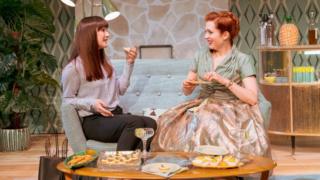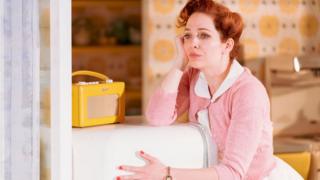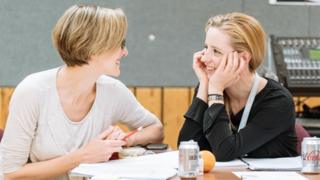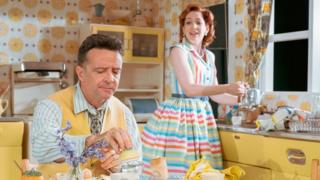 Image copyright Manuel Harlan
Image copyright Manuel Harlan Can you balance work and home life, and which should come first? That question is posed in a new play starring actress Katherine Parkinson, who says mothers have “a responsibility” to make the most of their skills.
It’s a familiar story in the acting world, as in all walks of life – a woman has children, pauses her career and then finds she’s been left behind.
“There are so many brilliant actresses in the generation above me where you go, ‘Oh they were great, what happened to them?'” says Parkinson, part rueful, part indignant.
“I know what happened to them – they just didn’t feel they ought to make that choice.”
While Parkinson, who has starred in TV’s IT Crowd and Humans, stresses she prioritises her two children, she sees no reason to sacrifice her career.
 Image copyright Manuel Harlan
Image copyright Manuel Harlan She was back at work six weeks after her second daughter was born, expressing milk on the Humans set.
“I had to go against my instincts,” she recalls. “I don’t like showing people my ankles and I had to express a bottle or three and just do it in the make-up chair and lose any dignity and any sexual allure that I might have had at 5am.
“You just do it and it’s amazing how people adjust. There are so many dads, particularly on crews, and mums who understand.”
She’s speaking while preparing to star in Laura Wade’s new play Home, I’m Darling, in which she plays a woman who gives up work to be a housewife and live in a fantasy of domestic bliss.
It opened at Theatr Clwyd in Mold, north Wales, this week and will move to the National Theatre in London at the end of July.
The plot may be about a woman who walks away from her job – but, behind the scenes, things have been designed to make it as easy as possible for the show’s cast and crew to juggle work and family.
You might also like:
- What becoming a mum taught Suranne Jones
- West End show job shares – could it work?
- Katherine Parkinson’s war in Georgia
The standard industry rehearsal schedule was rejigged so time could be used more productively, Parkinson explains.
“We’ve done a shorter working day, which has meant I haven’t missed a single bedtime. And we’ve worked harder in the [rehearsal] room and had a slightly shorter lunch break and some people have told fewer anecdotes – which is only a good thing.
“It’s very interesting to see that it’s fine. It works. A balance can be struck, and it’s not going to be detrimental to the work.”
Any working pattern is ultimately down to the boss. In this case, Parkinson’s boss is director Tamara Harvey, who has been using the Twitter hashtag #workingmum to document her own (often fraught) attempts to give her all to both work and kids.
Among other things, she’s detailed sleeplessness, motherly guilt and three-month-olds pooing loudly in big important meetings.
Harvey says: “I feel a responsibility, particularly as [Theatr Clwyd’s] artistic director, to be brave about talking aloud about the challenges of being a parent or a carer and also having a job, and also, and also.
“There is a movement to find a way of making it possible for people to be in the performing arts and have a family, because at the moment the danger is we are just leeching people once they have children – we lose all of these creative people from the industry because we don’t make it possible for that to happen.”
As for whether she thinks a balance can really be struck, that depends on how exasperated she feels at the time.
“Ask me moment by moment and I will give you different answers,” she says. “There are moments when I think it’s possible and there are moments when I think it’s completely impossible.”
In the play, “having it all” for Parkinson’s character Judy doesn’t mean having a job and children. It means baking cakes and ironing her husband Johnny’s shirts in their idealistic 1950s marriage.
 Image copyright Manuel Harlan
Image copyright Manuel Harlan “Having it all has been exposed as not necessarily as much fun as it sounds if having it all means having to do it all, all of the time,” writer Laura Wade says.
“Judy would think she and Johnny had found a better answer. That’s their best solution to that problem.”
Parkinson thinks her character retreats into the home because she wants a “simpler life”.
But the actress believes that in real life, women aren’t making the most of their talents if they stay at home, and she goes so far as to say they have a “responsibility” to work.
 Image copyright Manuel Harlan
Image copyright Manuel Harlan “Your responsibility if you’re a very clever person [like Judy] – is to be part of the workforce, in a way,” she says. “Maybe we should feel a collective responsibility to work.
“I think Judy needs to be in the workplace because there’s a forensic intelligence that ends up turning into a slight mania when she’s just in the house.
“It’s [like] when you see the very clever alpha mums at the school gates who start to treat motherhood as a job because they’re so gifted in so many areas.
“Sometimes those women can overmanage. You have parties that have been done by party planners for two-year-olds and all the rest of it, and you think, you should be in the workplace because you’re brilliant and you’re frustrated and you don’t even know it.”
That may be true, but some parents have little choice but to stay at home and some have little choice but to work. Some have accommodating bosses, some don’t.
On stage, the facade of Judy and Johnny’s fantasy marriage inevitably starts to crack.
Even if you opt for the “simple life”, the play shows that life is rarely simple.

Follow us on Facebook, on Twitter @BBCNewsEnts, or on Instagram at bbcnewsents. If you have a story suggestion email entertainment.news@bbc.co.uk.
Read more: www.bbc.co.uk









![[Video] How to get rid of bed bugs in Toronto](https://www.thehowtozone.com/wp-content/uploads/2019/10/maxresdefault-2-100x70.jpg)


